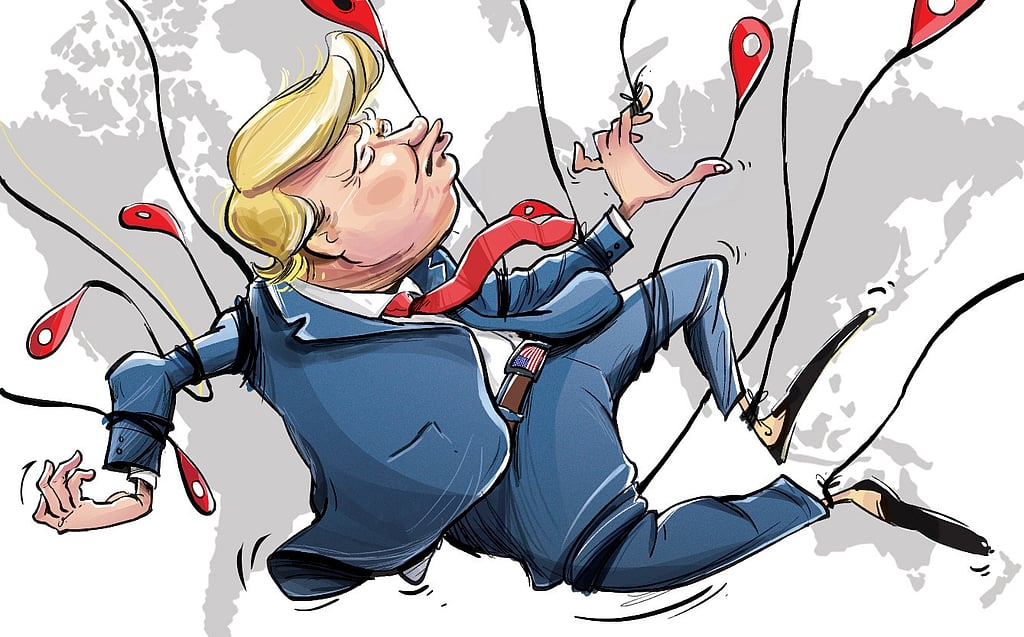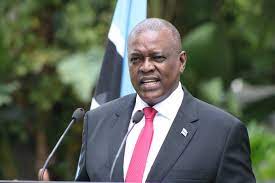
The world has now become irreversibly multipolar, a reality America’s ruling elites are refusing to accept.Photo | Mandar Pardika
Today’s China is not yesterday’s Soviet Union. Nor is Trump’s America the sole superpower. Anyone trying to push back the clock of history will get hurt
https://www.newindianexpress.com/author/sudheendra-kulkarni
The global tariff ‘war’ unleashed by US President Donald Trump has shown us a stark reality about the prevailing global order. It is that nations belong to three categories—those that bully, those that are bullied, and those that refuse to be bullied.

The second category has a few sub-categories—those who meekly choose to get bullied, those who are too weak to resist being bullied, and those who reckon that non-resistance is a better strategy as it would help in getting the best deal possible from the bully.
It doesn’t take deep research to know which category Trump-led America and Xi Jinping-led China belong to, and which sub-category India under Narendra Modi’s leadership finds itself in.
However, the recent dramatic events also show the limits to any country’s power to bully the rest of the world. Once a bully is effectively countered, he ceases to be a bully to the one resisting him—and seeks a compromise with his rival. If self-hurt were a sport, America has just won a trophy.
Trump began by announcing an across-the-board hike in tariffs on all countries—allies and others alike. Alongside came a threat: “Don’t escalate. If you do, you’ll be punched harder.” Predictably, one country—China—ignored the threat. It increased tariffs on American exports to China to nearly match the US tariff on Chinese exports. Mayhem ensued around the world.
Within the US itself, the turmoil in stock and bond markets sent sharply disapproving signals. The who’s who in America’s financial leadership feared a debilitating recession. Trump’s ‘Liberation Day’ quickly turned into a ‘Nightmare Day’.
All this forced him to backtrack with a 90-day pause on his decision. He lowered the tariff hike to 10 per cent on all countries—except China, which was slapped with a further massive increase. China hit back. Trump again blinked by giving tariff exemptions on electronic goods, largely imported from China.
Trump has repeatedly accused China of enriching itself at America’s expense. However, what the rest of the world can clearly see is that his maverick actions have less to do with tariffs and more to do with containing a rising China, which he sees as his country’s main economic, technological and geopolitical rival.
To understand what is happening in this rivalry, and what might happen in the time to come, it helps to turn the searchlight back to a similar momentous event nearly four decades ago. The fierce rivalry between the US and communist-ruled USSR ended in the collapse and disintegration of the latter.
It also ended the communist rule in Russia, which was the leader of both the Soviet Union and the Soviet-bloc countries in Eastern Europe. Why did the Soviet Union lose? Because it simply couldn’t match America’s superior economic and technological power.
The situation is vastly different now. Even though China is also ruled by a communist party, it has already become the world’s second-largest economy, and is within striking distance of overtaking the US in the coming decades. In cutting-edge technologies such as AI, robotics, drones, new energy, digi-tech and fin-tech, mostly built with atmanirbhar (self-reliant) efforts, China in some respects has gone ahead of America.
China’s lead over the US is even more pronounced in world-beating infrastructure and mass-scale manufacturing of cheaper, higher-quality goods—most strikingly illustrated by BYD overtaking Elon Musk’s Tesla in electric vehicles; Huawei giving tough competition to Apple; and China’s prowess in solar, wind and battery technology leaving the US and every other country way behind.
China is today the largest trading partner with the largest number of countries (over 120) in the world. America itself has become alarmingly dependent on Chinese imports because it chose to de-industrialise itself in the mistaken belief that militarisation and dollar-led financialisation of its economy will forever ensure its prosperity and global hegemony.
In short, today’s China is not yesterday’s Soviet Union. Nor is Trump’s US what America was when it was the sole superpower. The world has now become irreversibly multipolar, a reality America’s ruling elites are refusing to accept. They are trapped in a self-delusion that the rest of the world must genuflect before them, tolerate their threats and insults, and accept their demands.
If anyone needed proof of American hubris—and lack of civility—Trump himself, joined by his aides, has provided it plentifully. The US president claimed world leaders were “dying to make a deal” with him. “I am telling you, these countries are calling us up, kissing my a**. ‘Please, please, sir, make a deal. I’ll do anything sir’,” he bragged. No American president has ever publicly shown such vulgar contempt for other global leaders.
When Spain said it wants closer trade ties with China, US Treasury Secretary Scott Bessent warned that doing so would be “cutting your own throat”. Embarrassingly for him, Spanish Prime Minister Pedro Sanchez disregarded the warning and, the very next day, went to China for a meeting with President Xi. Clearly, America has lost a good deal of credibility and trust even in the eyes of its own allies.
What will—and what should—happen now? Four things. First, Trump will seek to cut a deal with Xi, which also suits the latter. American and Chinese economies, with significant inter-dependence, cannot be totally decoupled. It’s not as if the two countries are located on two different planets.
Economic globalisation is irreversible, and anyone trying to push back the clock of history gets isolated and hurt. Rather, global trade now needs strong new rules to stop bullies from destabilising and dynamiting it.
Second, countries—big or small, rich or poor—must respect each other and build relations on the basis of equality and mutual benefit. This also applies to US-India and China-India relations. Third, China, India and the EU should help America re-industrialise itself and live peacefully within its own territory.
The fourth is a wise warning sounded by the leader of one of the smallest countries in the world. Singapore’s Prime Minister Lawrence Wong, cautioning about Trump’s “arbitrary, protectionist and dangerous” action, said, “The last time the world experienced something like this was in the 1930s. Trade wars escalated into armed conflicts, and eventually the Second World War.”
A third world war? Nip the possibility in the bud.
Sudheendra Kulkarni
Gandhian peace activist; aide to former Prime Minister Atal Bihari Vajpayee in the PMO
(Views are personal)









